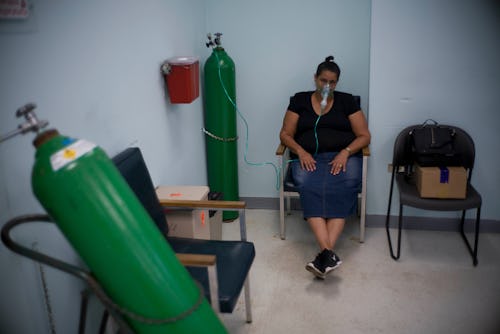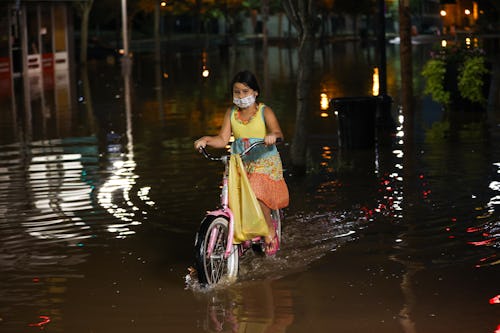
On August 29, Hurricane Ida collided into the Gulf Coast, leaving a trail of ruin in its wake. As of September 9, the number of reported deaths related to the storm had risen to 82 in Louisiana alone, all while the state’s hospitals were overwhelmed with COVID patients. Meanwhile, torrential rain flooded streets and homes along the East Coast.
The days that immediately follow hurricanes like Ida are devastating, to say the least. And while they may not grab as many headlines, so, too, are their lingering health effects. Experts say we need to brace ourselves for them, especially as climate change continues to make extreme weather events more frequent and intense.
“My concern is that the more frequent storms and more frequent natural disasters are going to impact the overall health and wellness of populations,” Frank Ghinassi, President and CEO of Rutgers Health University Behavioral Health Care, tells Mic. “You have to wonder: What will be the government’s ability to manage not two, or three, or four, but what if they have to manage six, or seven, or eight of these simultaneously?”
Here’s a rundown of the physical and mental health effects of hurricanes that can persist for weeks, months, or even years after a storm hits, as well as how to navigate them.
Infections and worsened respiratory issues
“Honestly, the biggest [physical health impact] that comes to mind is the impact of shutting everything down and displacing people,” says Dan Shirley, an infectious disease physician at UW Health in Madison, Wisconsin. “Access to their usual medicines or healthcare in general would be decreased.”
Hurricanes can damage other parts of the infrastructure, too. Drinking water might be unavailable, and wastewater might go untreated for days to weeks, explains Kellogg Schwab, a professor at Johns Hopkins Bloomberg School of Public Health with a background in environmental microbiology and environmental engineering.
As we’ve seen with previous hurricanes — especially Hurricane Katrina — recovery can take months or even years, meaning you might be exposed to these abnormal conditions and their associated risks for longer than you originally anticipated, Shirley says.
What are these risks? There’s infection, for starters. “There are different types of microorganisms that can be present after a flood event,” Schwab says. These can include bacteria like E. coli or Salmonella, or parasites like Giardia. Survivors might even unwittingly ingest norovirus from human waste. Usually these germs cause acute illness, nausea, vomiting, and diarrhea. “Most people recover,” Schwab says, but “you don’t want to be ill if you’re trying to remediate your house.” All of this points to the importance of frequent hand-washing post-hurricane, ideally with soap and water that’s clean enough to drink.

Schwab and Shirley both note that cuts and other injuries that tend to occur more often in hurricanes (during escape attempts, for example) can also leave people more susceptible to infection. Schwab cautions against wading in water if possible — not only because of the hazards it could conceal, but also the germs that can enter wounds, like Vibrio vulnificus. Though rare, this flesh-eating bacteria can be deadly if not treated in time. Because flooding can also create more places for mosquitoes to breed, Schwab also recommends wearing repellent to safeguard against the diseases mosquitoes might carry.
People with suppressed or compromised immune systems might have to worry about lung infections that could arise from inhaling mold, Shirley tells Mic. The problem is, Schwab says, mold can grow rapidly and remain for months — and you might not even see it because of its ability to take hold behind your walls. That’s why he suggests wearing an N95 mask, gloves, and goggles while you’re cleaning up your home post-hurricane, especially if you have a weakened immune system. Shirley points out that breathing in mold could also worsen asthma and other chronic respiratory diseases.
Marginalized communities that lack reliable transportation and other means of getting out of harm’s way are most susceptible to these potential impacts, Schwab says. Shirley adds that factors such as housing that already poses environmental hazards, lack of health insurance, and poor nutrition can ramp up risk, too. Hurricane Katrina is a well-documented example of how natural disasters can further expose environmental racism and other longstanding inequities.
Besides taking public health precautions like washing your hands, Schwab suggests creating a plan of action with your loved ones and anyone you live with before disaster strikes. Pack a flashlight with batteries, medications, and other necessities in a hurricane go-bag. The CDC and EPA websites also offer a bunch of hurricane preparedness tips, he says.
Violence
Ghinassi points to a handful of studies and reports documenting an increase in domestic and family violence after natural disasters. These incidents typically consist of men inflicting physical and emotional violence on women and children, according to The Conversation, and they can surge for months or even years after the disaster. In a study of residents of various Mississippi trailer parks, the rate of gender-based violence more than tripled from August 2005, before Katrina hit, to 2006. That figure dropped in 2007, but was still double that of pre-Katrina levels.
What could underlie these trends? Some experts believe perpetrators act violently in order to exert power over a situation that has left them feeling disempowered, per the New Jersey Department of Children and Families. Natural disasters could also trigger drug use, sleep disturbances, PTSD symptoms, and other stressors that can escalate into violence. Women are more at risk of experiencing domestic violence, the department added, as are people who live in urban areas and face economic distress.
Violence against women, in turn, has a number of potentially lasting health consequences, according to the World Health Organization — not only physical injuries, but also depression, suicide attempts, and substance use. If you or a loved one is experiencing violence, the American Psychological Association has a comprehensive list of resources you can turn to for help.
You have to wonder: What will be the government’s ability to manage not two, or three, or four, but what if they have to manage six, or seven, or eight of these simultaneously?
Trauma and other psychological repercussions
The human response to a trauma like a hurricane tends to follow a pattern, Ghinassi says. Immediately after the event, people might experience a sense of shock, anxiety, grief, or loss of control. Later, they and their community might feel like “they're all in this together," working collectively to search for and shelter survivors, for example.
Then come the more complicated long-term responses. Eventually, the attention from the media, FEMA, and other entities devoted to hurricane aftermath dies down, and those groups move on to the next natural disaster. “Those things never quite deliver as much as people hope, and they never quite do it quickly enough, so there’s often a period of disillusionment," which can last weeks or sometimes months, Ghinassi explains. Survivors may feel forgotten or abandoned.
Finally, around six months after a hurricane, survivors usually start to accept a new reality as it dawns on them “that maybe there isn’t going to be a return to what used to be,” Ghinassi says. They might contemplate what that new reality looks like, how they’ll fare in it, and whether it’ll meet their needs. After a deadly tornado pummeled the Ghinassi’s Ohio town in 1985, he came to terms with the fact that he lived in a part of the state where tornadoes were not only possible, but also part of the landscape.
Especially worrisome are the psychological scars hurricanes can leave on those who have already undergone trauma, he points out. For these folks, a hurricane may lead to PTSD, the symptoms of which could persist for the rest of their lives. Survivors might be gripped by intense anxiety when they see storm warnings on TV or dark clouds gathering, for example.
Indeed, hurricanes can shape how someone responds to future stressors, Ghinassi says. Two factors play a role. The first is whether they’re genetically predisposed to being vulnerable to stressors, by virtue of family members who’ve had anxiety or stress-related disorders. That person’s genetic predisposition may never materialize — unless they’re exposed to something, like a severe hurricane, that exceeds their ability to cope.
The second factor is the existing stress they bring to a hurricane, which Ghinassi likens to Wi-Fi bandwidth. “If you’re coming to a natural disaster and you’re already using up a lot of your Wi-Fi bandwidth, it doesn’t take much for you to lose reception,” he says. In other words, if you’re struggling with, say, job and food insecurity, “that hurricane is going to be a very different hurricane than it is for your more secure neighbor who lives maybe two suburbs over.” Indeed, a 2018 study found that people who couldn’t access medical care during Hurricane Harvey were more likely to show symptoms of depression, PTSD, and anxiety than those who could access care.
Even those who don’t go on to develop clinically diagnosable PTSD can experience hyper-vigilance for a year or two after a hurricane, or possibly longer (in contrast to people with PTSD, which is a far longer-lived phenomenon), Ghinassi notes. They’ll notice cues that never hit them before, like a warning for a hurricane a few states over on an onscreen news ticker.
If you think you’re experiencing a psychological disorder related to a hurricane, Ghinassi recommends first telling a medical professional you trust, whether that’s your primary care doctor or your obstetrician. They can help you determine if this is something that warrants specialized care from a mental health professional.
Ideally, you’d prepare yourself for the psychological impacts of a hurricane by keeping your baseline level of stress as low as possible, according to Ghinassi. That means trying your best to eat healthy, balanced meals; clock in at least eight hours of sleep a night; move your body at least 30 to 60 minutes a day; socialize at least a few times a week; and engage in deep breathing and mindfulness. All of these practices are designed to build resilience — “one of the protective factors against stress,” Ghinassi says.
All of this is to say that survivors live with the physical and mental health effects of hurricanes long after the winds and rains have passed, and the news cycle has latched onto another catastrophe. As we continue to reckon with climate change, we need to consider the toll it takes on our minds and bodies, too.







